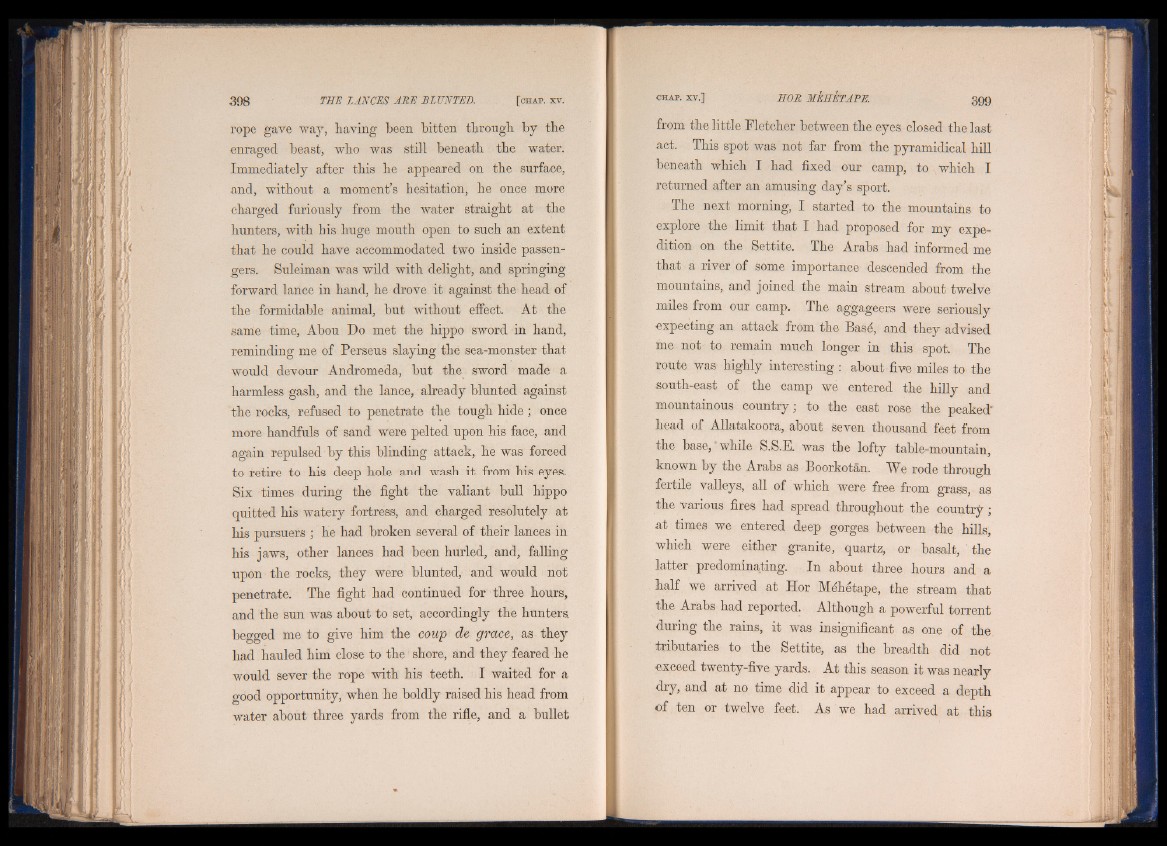
rope gave way, having been bitten through by the
enraged beast, who was still beneath the water.
Immediately after this he appeared on the surface,
and, without a moment’s hesitation, he once more
charged furiously from the water straight at the
hunters, with his huge mouth open to such an extent
that he could have accommodated two inside passengers.
Suleiman was wild with delight, and springing
forward lance in hand, he drove it against the head of
the formidable animal, but without effect. At the
same time, Abou Do met the hippo sword in hand,
reminding me of Perseus slaying the sea-monster that
would devour Andromeda, but the sword made a
harmless gash, and the lance, already blunted against
the rocks, refused to penetrate the tough hide; once
more handfuls of sand were pelted upon his face, and
again repulsed by this blinding attack, he was forced
to retire to his deep hole and wash it from his eyes.
Six times during the fight the valiant bull hippo
quitted his watery fortress, and charged resolutely at
his pursuers ; he had broken several of their lances in
his jaws, other lances had been hurled, and, falling
upon the rocks, they were blunted, and would not
penetrate. The fight had continued for three hours,
and the sun was about to set, accordingly the hunters
begged me to give him the coup de grace, as they
had hauled him close to the shore, and they feared he
•would sever the rope with his teeth. I waited for a
good opportunity, when he boldly raised his head from
water about three yards from the rifle, and a bullet
from the little Fletcher between the eyes closed the last
act. This spot was not far from the pyramidical hill
beneath which I had fixed our camp, to which I
returned after an amusing day’s sport.
The next morning, I started to the mountains to
explore the limit that I had proposed for my expedition
on the Settite. The Arabs had informed me
that a river of some importance descended from the
mountains, and joined the main stream about twelve
miles from our camp. The aggageers were seriously
expecting an attack from the Basé, and they advised
me not to remain much longer in this spot. The
route was highly interesting : about five miles to the
south-east of the camp we entered the hilly and
mountainous country; to the east rose the peaked'
head of Allatakoora, about seven thousand feet from
the base,'while S.S.E. was the lofty table-mountain,
known by the Arabs as Boorkotân. We rode through
fertile valleys, all of which were free from grass, as
the various fires had spread throughout the country ;
at times we entered deep gorges between the hills,
which were either granite, quartz, or basalt, the
latter predominating. In about three hours and a
half we arrived at Hor Méhétape, the stream that
the Arabs had reported. Although a powerful torrent
during the rains, it was insignificant as one of the
tributaries to the Settite, as the breadth did not
exceed twenty-five yards. At this season it was nearly
dry, and at no time did it appear to exceed a depth
of ten or twelve feet. As we had arrived at this